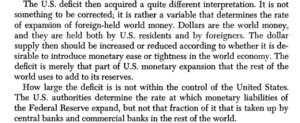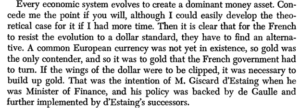In 1968, Mundell agreed with his and Laffer’s doctoral advisers (Kindleberger and Despres) that there were untold amounts of dollars in foreign hands for the simple and benign reason that foreigners liked to hold dollars. As he expressed in an article of that year:

The dollar, to paraphrase the advisors, was the preferred form of world monetary liquidity. Therefore, the United States produced dollars, the world acquired a healthy portion of them by selling goods or by acquiring dollar-income streams, and foreigners got the kind of money they wanted. Everything was working well, no matter the scary word “deficit.”

Mundell cautioned, however, that not everyone was happy—perhaps fundamentally for political and sociological over economic reasons—at the global predominance of the dollar. The French wanted there to be a gold standard. So they, unusually among the major nations, kept demanding gold on accumulating dollars. Mundell wrote:

[All from Robert A. Mundell, “The Collapse of the Gold Exchange Standard,” American Journal of Agricultural Economics 50, no. 5 (Dec. 1968).]
The French wished there were an alternative to a dollar system but could not figure out how to force a good alternative on the world. They tried by building up a national gold stock, as a means of delegitimizing the pound and dollar, in favor of national currencies each based on gold. The effort came to naught, in that by 1971 the United States suspended, for good, any payments to foreign authorities in gold at $35 per ounce or any price. Soon currencies floated for good on the market.
Mundell held that a crisis did exist in the 1960s, but it was not the one all the officials and academics had identified.
NOT A CRISIS: The balance of payments “deficit” the United States was running was not a problem, for all the cacophonic insistence that it was. The “deficit” existed because foreigners really wanted the dollar of their own free choice: not a problem.
A CRISIS: The problem was that there was a notable segment of opinion in the world, typified by the French, that it was ridiculous to have sovereign fiat currencies at all, let alone a dominant one. Currencies should be defined classically, as in gold. This view became widespread among global populaces in the 1970s as the dollar became completely fiat as stagflation fired up. Mundell’s French led global popular opinion in harboring Tocquevillian dread of the emergence of a globally dominant fiat dollar.
